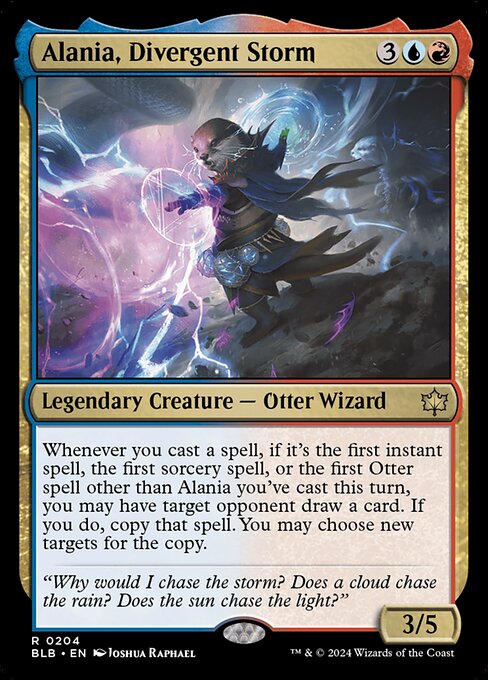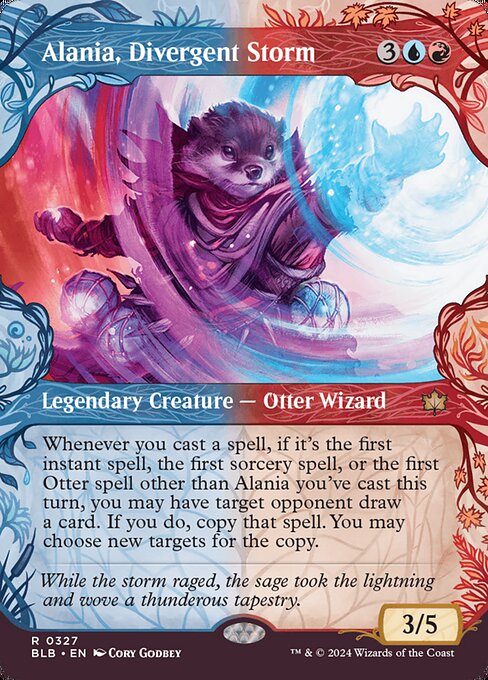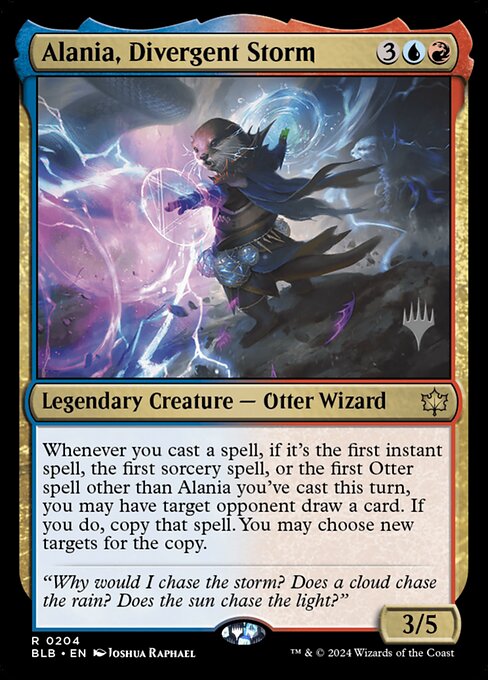Alania, tempête divergente
Créature légendaire — loutre et sorcier
À chaque fois que vous lancez un sort, si c'est le premier sort d'éphémère, le premier sort de rituel ou le premier sort de loutre autre qu'Alania que vous avez lancé ce tour-ci, vous pouvez faire qu'un adversaire ciblé pioche une carte. Si vous faites ainsi, copiez ce sort. Vous pouvez choisir de nouvelles cibles pour cette copie.
3/5
standard
future
historic
gladiator
pioneer
explorer
modern
legacy
pauper
vintage
penny
commander
brawl
alchemy
paupercommander
duel
oldschool
premodern
Rulings
Alania’s ability and the copy it creates both resolve before the spell that caused the ability to trigger. They resolve even if the spell is countered before the copy is created.
Any choices made when the spell resolves won’t have been made yet when it’s copied. Any such choices will be made separately when the copy resolves.
A resolving copy of a permanent spell becomes a token. That token isn’t “created” and won’t interact with abilities that care about tokens being created.
You can’t choose to pay any additional costs for a copied spell. However, effects based on any additional costs that were paid for the original spell are copied as though those same costs were paid for the copy too.
Alania’s ability can trigger up to three times in a single turn: once when you cast your first instant, once when you cast your first sorcery, and once when you cast your first Otter spell other than Alania.
The copy will have the same targets as the spell it’s copying unless you choose new ones. You may change any number of the targets, including all of them or none of them. If, for one of the targets, you can’t choose a new legal target, then it remains unchanged (even if the current target is illegal).
The copy is created on the stack, so it’s not “cast.” Abilities that trigger when a player casts a spell won’t trigger.
If the spell that’s copied has an X whose value was determined as it was cast, the copy has the same value of X.
Any choices made when the spell resolves won’t have been made yet when it’s copied. Any such choices will be made separately when the copy resolves.
A resolving copy of a permanent spell becomes a token. That token isn’t “created” and won’t interact with abilities that care about tokens being created.
You can’t choose to pay any additional costs for a copied spell. However, effects based on any additional costs that were paid for the original spell are copied as though those same costs were paid for the copy too.
Alania’s ability can trigger up to three times in a single turn: once when you cast your first instant, once when you cast your first sorcery, and once when you cast your first Otter spell other than Alania.
The copy will have the same targets as the spell it’s copying unless you choose new ones. You may change any number of the targets, including all of them or none of them. If, for one of the targets, you can’t choose a new legal target, then it remains unchanged (even if the current target is illegal).
The copy is created on the stack, so it’s not “cast.” Abilities that trigger when a player casts a spell won’t trigger.
If the spell that’s copied has an X whose value was determined as it was cast, the copy has the same value of X.
Rulings
Alania’s ability and the copy it creates both resolve before the spell that caused the ability to trigger. They resolve even if the spell is countered before the copy is created.
Any choices made when the spell resolves won’t have been made yet when it’s copied. Any such choices will be made separately when the copy resolves.
A resolving copy of a permanent spell becomes a token. That token isn’t “created” and won’t interact with abilities that care about tokens being created.
You can’t choose to pay any additional costs for a copied spell. However, effects based on any additional costs that were paid for the original spell are copied as though those same costs were paid for the copy too.
Alania’s ability can trigger up to three times in a single turn: once when you cast your first instant, once when you cast your first sorcery, and once when you cast your first Otter spell other than Alania.
The copy will have the same targets as the spell it’s copying unless you choose new ones. You may change any number of the targets, including all of them or none of them. If, for one of the targets, you can’t choose a new legal target, then it remains unchanged (even if the current target is illegal).
The copy is created on the stack, so it’s not “cast.” Abilities that trigger when a player casts a spell won’t trigger.
If the spell that’s copied has an X whose value was determined as it was cast, the copy has the same value of X.
Any choices made when the spell resolves won’t have been made yet when it’s copied. Any such choices will be made separately when the copy resolves.
A resolving copy of a permanent spell becomes a token. That token isn’t “created” and won’t interact with abilities that care about tokens being created.
You can’t choose to pay any additional costs for a copied spell. However, effects based on any additional costs that were paid for the original spell are copied as though those same costs were paid for the copy too.
Alania’s ability can trigger up to three times in a single turn: once when you cast your first instant, once when you cast your first sorcery, and once when you cast your first Otter spell other than Alania.
The copy will have the same targets as the spell it’s copying unless you choose new ones. You may change any number of the targets, including all of them or none of them. If, for one of the targets, you can’t choose a new legal target, then it remains unchanged (even if the current target is illegal).
The copy is created on the stack, so it’s not “cast.” Abilities that trigger when a player casts a spell won’t trigger.
If the spell that’s copied has an X whose value was determined as it was cast, the copy has the same value of X.
Votre collection ? vos decks ?
Envie de gérer votre collection et/ou créer des decks ?



 0
0
 0.17€
0.17€


